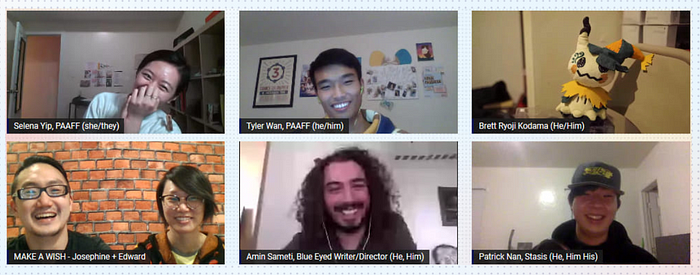Funding A Lifeline: Supporting Community through Film

Filmmaking has always been a powerful tool to preserve memory, reveal truth, spark joy and bring communities together. And for BIPOC communities, SIFTMedia 215 Collective Inc. Co-Founder and grantee Nadine Patterson underscored filmmaking’s urgency: “telling Black and brown narratives saves lives. It’s a lifeline.” A recent report from the Ford Foundation, Beyond Inclusion, suggests the inverse is also true: that people of color are critical to the documentary ecosystem. During a time where Black Lives Matter is shaping the public imagination and policy, we can surely recognize the value that Black creators have contributed to the film ecosystem as a whole. However, like other marginalized communities, Black filmmakers and the organizations that support them have often been excluded, under resourced, or pigeonholed to create popular narratives that do not inspire them.
This past fall, I led IPMF’s board and staff through an intentional learning process about the local filmmaking landscape in effort to better understand what the needs are and how we might respond as a foundation. Support of the film community has been integral to IPMF, which grew out of WYBE, a public television station where many filmmakers in the region, like Nadine, got started. Through convenings, conversations, readings, webinars and podcasts, we listened and reflected. Key themes emerged about the media ecosystem of Greater Philadelphia:
- Compensation and sustainability;
- Training, mentorship and professional development;
- Networks; community engagement;
- Trust and respect in funder relationships.
The convenings resulted in grants that were responsive to the needs we heard being expressed by the community, and a large chunk of the grants were determined by community stakeholders. In this essay, I offer a snapshot of our learning and how it has informed our most recent grant cycle and goals moving forward.
Compensation and Sustainability
Filmmakers and film organizations struggle financially. It is clear that many media organizations do not have a safety net or the ability to pay staff a livable wage. This leads to overworked and underpaid staff who burn out.
The fact is that making high quality films is expensive and this is a huge barrier for individuals from underrepresented groups, as they face structural barriers when seeking institutional funding. There is a need to invest in filmmakers as people, in addition to their projects.

Training, Mentorship and Professional Development
In our conversations, folks brought up the need for mentoring, training, professional development opportunities several times. Organizations like Scribe and PhillyCAM do an excellent job at training emerging filmmakers and providing them opportunities to create and share their work. These organizations, and others like Big Picture Alliance, engage youth who would otherwise not have access to the art of filmmaking because it is a luxury that is absent from the average public school. Firelight Media, which develops first and second time adult filmmakers directly through labs, grants and mentoring, is another well-established model that grows filmmakers at a later stage in their artistic career.
Mentorships and internships are also useful pathways for emerging filmmakers to gain experience and one-on-one training. However, unpaid internships and “shadowing” for free are often barriers for youth and emerging artists. There is a pressing need for more programs to help emerging filmmakers create more professional work and critical opportunities for folks who cannot afford film school and want to sharpen their craft. Mentor programs like PhillyCAM’s ArtsToWork are effective models that could be scaled up. The summer pilot program paid both youth mentees and mentors, who found it to be an enriching experience.
Networks
While Philly’s community media scene is known for its collaborative nature, organizations discussed needs for a strengthened network with fewer silos. Finding allies, institutional allies, in all sectors and geographies is critical. For example, local universities, libraries and other institutions can help communities see local films by offering space to convene and view work. One of the most difficult challenges for film festival organizations is securing affordable venues that are accessible in terms of transportation and mobility.
There is value in connecting communities and media makers, across sectors and geographic borders, as well. Opportunities do exist and more could be created — but organizations often lack the capacity to explore possible networks and follow through. When filmmakers and media organizations travel to other cities to convene with their counterparts, it can be quite energizing and lead to rich collaborations and increased visibility of their work.
For filmmakers, access to networks of funders, producers and distributors (who have national reach) can totally transform their projects and careers. Several filmmakers noted that film festivals are effective vehicles for these connections.

Community Engagement
While there are film organizations that have been supportive of local creatives, others prioritize celebrity, national notoriety or commercial work. Local film festivals have been criticized for the lack of representation of local filmmakers when it comes to screenings and engagement. Some festival leaders have been exploring other ways to engage, connect and support local filmmakers, however. For example, this year the Philadelphia Latino American Film Festival (PHLAFF) piloted a film residency program in the Norris Square neighborhood. BlackStar is seeking to create a filmmaker lab program that targets first and second time filmmakers from the Philly region. These festivals and the Philadelphia Asian American Film Festival (PAAFF) seem to be spaces that help connect and inspire local media makers while engaging many community partners and their diverse audiences.
Some film projects benefit from having an impact campaign, a strategy that engages audiences and usually encourages them to respond with action in some way. Not all films need impact campaigns, but filmmakers who seek to create concrete change tend to view them as an important tool. Engagement looks different for each film depending on its context and goal — whether it’s to shift public opinion, mobilize community, create policy change or something else. Organizations like Working Films help filmmakers develop impact campaigns. However, filmmakers underlined that the impact funding landscape is underfunded — funds are needed for filmmakers to partner with organizations like Working Films and other consultants who are experienced in developing impact strategies.
Trust and Respect in Funder Relationships
Trust and respect came up several times in conversations about relationships with funders. Here were some key takeaways we heard loud and clear: avoid heavy burdens and extractive practices; avoid pressuring organizations towards rapid expansion that is not organic. Instead, help organizations deepen and strengthen what they are good at.
As funders we should also honor the complexities that community media organizations navigate, like the tension between product and process, the value in media making as cultural work, and the desire to create a pipeline. Some filmmakers have an interest in taking their craft to the next level, but this is not the case for everyone. Make room to understand and support a range of approaches that ultimately enrich the stories, storytellers and the communities they come from.
We recognize the power and privilege that philanthropic institutions wield. As a foundation that values community and trust-based philanthropy, we take this feedback seriously. If and when we do not live up to these standards we expect to be called in and promise to do better. This is what accountability to community looks like. We invite our funding colleagues to join us.
Moving Forward: Interventions for IPMF
Following our learning process this fall, IPMF took steps toward supporting the local filmmaking community through investments in individuals and organizations that help the sector thrive.
Through a November grant cycle, IPMF sought to meet the urgent needs of well respected local media organizations and filmmakers who engage vulnerable communities and align with our social justice values. This includes two film projects, three small organizations that teach emerging filmmakers, and three film festivals that center the work of BIPOC communities. See this press release or our website for a full list of film-related grants, as well as two documentary projects we supported earlier in the year.
In this cycle, we also supported 18 film projects led by promising local filmmakers through a nominations process. The four nominators, Melissa Hamilton, Jos Duncan, Nadine Patterson and Kristal Sotomayor, share vast knowledge of the film and media arts scene in the Philly area. Together they offered recommendations, deliberated and determined grants totaling $400,000. This nominations process aligned with our vision to share and shift power with community in pursuit of justice and change, something we want to see more of within the philanthropy sector. We look forward to convening filmmaker grantees in the new year and fostering community among them.

In addition to these short term interventions, IPMF has begun to discuss some long term strategies. We hope to continue funding local film projects led by storytellers from marginalized groups and fund them generously, so they can hire professional crews to make their films well and pay themselves. In addition to funding specific projects, we hope to invest in emerging and seasoned filmmakers as creatives (through networks, training, and paid mentoring opportunities).
Another priority for the long-term is to invest in organizations that teach, support and elevate local media makers. Many organizations support both emerging and seasoned filmmakers — but could go deeper with more support. With more resources these organizations can also better compensate their staff.
Lastly, IPMF hopes to leverage connections with potential collaborators, including funders and institutions that could better support Philly filmmakers. To other funders in the region who are curious about supporting filmmaking (or local media more broadly) I would love to speak to you.
If we are wildly successful, there will be ample opportunities for people of all ages and backgrounds to be inspired by independent filmmaking and motivated to create. Filmmaking will be recognized as a tool for community building and social change across various sectors. BIPOC artists will have opportunities to tell stories that are nuanced and authentic — unfettered by the white gaze and commercial pressure. Strong networks and pipelines will connect local filmmakers to national resources and wider audiences. And those who choose to work in this field, cultivating the creatives and audiences who engage them, will be fairly compensated and nurtured so that the field is able to sustain and thrive.
Our learning will continue as this ecosystem evolves during this historic time and we aim to be nimble and responsive. As we move forward toward our goals and continue to sharpen our strategy in 2021, I hold deep gratitude to everyone who shared their insight and experience. And I cannot wait to see so much beautiful and transformative work from our community come to fruition in the coming year.







